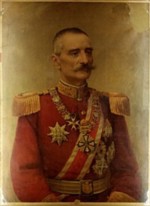Split
So we eventually arrived in Split. We'd booked an apartment near the old town on line, that advertised free parking. This turned out to be a communal lot across the street where, fortunately, someone had just left.
The apartment was on the top floor of a four-storey block (no lift). We rang the bell. A wizened woman arrived:
"Go away," she said rudely. "Is this Apartment Bulic," we enquired? "Go away," she repeated and slammed the door.
Had we been scammed? Where could we go? We checked the details. Wendy rang our contact. An apologetic man appeared. The woman was the cleaner and she hadn't finished - she angrily removed her bucket.
Inside the apartment was modern and spacious and even had views.
We walked to the old town.
Gregory, bishop of Nin they're lining up the steps to rub his foot.
Greeting us more politely was the statue is of Gregory, bishop of Nin, who, in the 10th century under the protection of King Tomislav, broke with Rome and introduced the mass (and services) in Croatian thus strengthening both Christianity and Croatian independence and culture.
Rubbing his foot is said to bring good luck.
There was an air of expectancy among the hordes of tourists gathering in the square then heralds trumpeted the arrival of the Emperor Diocletian who appeared to welcome us; and our money.
The Emperor Diocletian soon appeared to welcome us
Not only had he somehow survived over 1700 years but he'd knocked a few years off his age to boot
At the turn of the 4th century a massive fortress was built on what is now Split harbour near the tip of the Split peninsular to serve as the Roman emperor Diocletian's retirement home. About half of it was for Diocletian's personal use, and the rest housed a military garrison. This 'palace' now forms the major part of the historic core of Split, which in 1979 was listed by UNESCO as a World Heritage Site.
Obviously, Diocletian's mother was a pagan, so he grew up believing in and relying on those silly gods. After Christianisation, the older pagan gods were replaced by the Trinity and the Saints (much more sensible) although, perhaps not as efficacious?
The Temple of Jupiter was rededicated to the Virgin Mary and became a baptistery.
The Temple of Jupiter - a silly god
The Temple was rededicated to the Virgin Mary and became a baptistery
I have to dodge Wendy - she has a bottle of water
Throughout the Middle Ages Croatia remained aligned with Christian neighbours, first with the Byzantine Empire and then with the Austro-Hungarians, acting as a bulwark against the Muslim Ottoman Empire. So, it was these religious tensions that flared, yet again, between 1992 and 1999.
Churches have replaced temples - much more sensible
We needed to eat and Restoran Babilon was recommended by our apologetic host, a five-minute walk from our apartment. It's a nice (large) family place with kids welcome - toys provided - and good food.
|
At Restoran Babilon. September 7, 2019 · Split, Croatia: Wendy: I’ll have the mussels please. Tuna salad duly provided and eaten. Bill called for. Wendy: Excuse me, I ordered mussels and you said you didn’t have any. Notwithstanding, we were charmed by the local atmosphere and went again the following night. Waiter (smiling): Hello again! Tonight, we've got mussels. A long wait ensues - during which Richard is served... Waiter (to Wendy - still waiting): Sorry we don’t have mussels.
|
There is, of course, a museum too - with an eclectic collection.
An eclectic collection
In common with the other old cities we visited, Split too has undergone recent restoration. During World War 2 it was bombed and shelled, by both sides, and again when Croatia seceded from Yugoslavia in 1991.
Around the same time Dubrovnik was being shelled, the Yugoslav Navy shelled recently-repaired Split as well - presumably so they wouldn't feel left out.
One of Split's attractions is its harbour and the surrounding waters. The marina had some impressive yachts moored. We took a cruise - wine included.
Lots of private yachts and several cruise ships
There are some grand houses and very expensive real estate along the shore, including a large house once owned by President Tito, now a marine institute, and another used in the TV series 'Game of Thrones'.
The Split peninsular is Adjacent to a pass through the Dinarides mountains that form a physical barrier between the Adriatic Sea and the continental heartland of the Balkan Peninsula. So, the anchorages in this region have been of trading and strategic importance since civilisation began.
Some expensive real estate
The ruins of the Roman city of Salona are in the distance
The nearby Illyrian settlement of Salon is written of as early as the 7th century BCE. In due course this became an important Greek outpost and then the Roman city of Salona, where Diocletian was born. Like Pope Benedict Diocletian declined to die in office and planned to end his reign by abdicating in 305 CE. Hence his building the Palace of Split in one of the haunts of his youth - he'd always loved that harbour!
It's said that he took to growing flowers and vegetables - a bit like Prince Charles - with whom he had quite a bit in common - at least in the way of palaces; guards so on.

